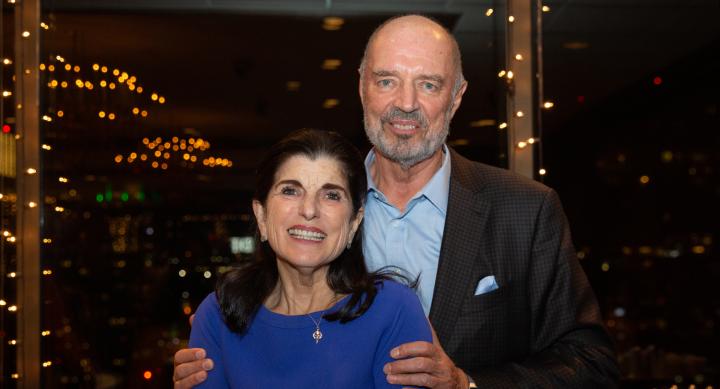
Luci Baines Johnson and Ian Turpin
“Fixing a Hole:” Couple finds supporting gerontological nursing “enormously satisfying”
During the years Ian Turpin and his wife, Luci Baines Johnson, cared for their ailing and aging mothers, they found that very few health care practitioners had the expertise, skills and training to significantly manage the needs of elderly patients.
“Because of our longtime relationship with The University of Texas at Austin School of Nursing and our positions on the boards of local hospitals, we were blessed to be well-connected to health care experts, better than most lay people are, and so we knew the questions to ask and of whom,” Ms. Johnson said.
Her husband agrees. “The bottom line is that there are holes in the health care system,” Mr. Turpin said. “Geriatric expertise is scarce, but geriatric issues don’t just affect the elderly individual, they affect the whole family and everyone who loves them. Attracting the people we need to support this segment of health care delivery isn’t easy. Those working in geriatrics are not going to be at the head of the list for financial reward.”
Locally, the lack of geriatric-trained health care providers is especially concerning since 2010 Census data show that between 2000 and 2010 the Austin-Round Rock metropolitan area had the fastest growing “pre-senior” population (those aged 55–64) in the nation and ranked second in senior (aged 65 and older) population growth over the same period.
Ms. Johnson said it was her husband who initially focused strongly on gerontology and who wanted to begin supporting geriatric nursing education because of his mother’s influence when he was young and also because of the excellent care she received toward the end of her life.
“My mum Margaretta was a nurse,” Mr. Turpin said. “She trained in Glasgow, Scotland, during World War II and received a scholarship to study the health care system in Denmark. Eventually she and my father moved to London. There she practiced what in the UK is called ‘district nursing,’ in which care is managed within the community and teams of community nurses and support workers treated housebound patients in their homes.”
Margaretta Turpin practiced nursing into her early 60s. “She was a bright woman and she loved nursing,” Mr. Turpin said. “For her, it was more than a job.”
After his mother’s dementia diagnosis and as she began to decline, the couple decided to hire a physical therapist to help her regain some mobility.
“The therapist was young and particularly vivacious. I was amazed at her energy and asked why she had chosen a career in geriatrics when she might have worked in pediatrics, for instance,” Mr. Turpin said. “She said, ‘Since I have worked with older patients, I have found them to be so grateful. After I teach them something simple, such as getting out of a chair, it changes everything for them. The simple things are big for elderly people.’”
Not long afterwards, the couple had some friends and family over. When Ms. Turpin walked from her room to the dining room on her own, there wasn’t one dry eye.
“Everyone was cheering,” Ms. Johnson said. “But the one cheering the most was that young therapist. We simply don’t have enough of these people with that level of expertise to make the small differences, which are, in reality, big differences for older people. And we know it’s the bedside nurses who help get the elderly out of bed and help them have a more meaningful life.”
As her 80th birthday approached, Ms. Turpin, who was by this time in assisted living, asked her son and daughter-in-law to tell party guests she didn’t want any gifts, she didn’t need anything.
“I said, ‘I disagree! Yes, you do!’ Ms. Johnson said. “Margaretta said, ‘What do you think I want?’ and I said, ‘How about a gift to the UT Austin School of Nursing so that your love of this profession lives long after you.’ Fortunately, she agreed, and people did give.”
That gift funded scholarships for undergraduate nursing students. But Mr. Turpin and Ms. Johnson weren’t finished.
Once the pandemic struck, it was clear that health care workers in hospitals and intensive care units would be the ones on the frontlines working tirelessly to keep people alive. For that reason, Mr. Turpin felt an urgency to help more people go into a health care career. And because COVID-19 targeted the elderly in particular, and nursing is such a critical part of the care spectrum, he decided to establish a fellowship for graduate nursing students in gerontology and aging studies. In short order, he established the Margaretta Turpin Graduate Fellowship in Nursing at the UT Austin School of Nursing.
“Geriatrics is an important field but a difficult field,” he said. “Nursing, as a whole, is in a real crisis right now. Now more than ever nurses need help. If you’re wanting to support an interest in geriatrics, then the graduate level is where you need to be.”
When asked what his mother would have thought about the fellowship, he said, “I think she might be overwhelmed! It would have given her a great sense of satisfaction.”
“Our interest in geriatrics continues to grow and supporting students is enormously satisfying,” Ms. Johnson said. “What a thrill it is for Ian to do this in his mother’s memory and to support the nursing profession. His mother would have loved it!”
Donor Spotlight
Luci Baines Johnson, 2025
Sharon (Leyland) Ahrari, 2025
Christy and David Dauphin, 2025
Carolyn R. and Gary L. Mueller, 2024
Jim Connell, 2024
Tamra Kay Beasley, 2024
Jeff Petterson, 2022
Luci Baines Johnson and Ian Turpin, 2021
Jeff and Kim Chapman, 2020
Maureen and Robert Decherd, 2020
Luci Baines Johnson and Ian Turpin, 2020
John Chamberlain, 2019
Luci Baines Johnson, 2018
Earl and Myrtle Walker, 2018
Mary Lou Adams, 2017
Audrey Decherd, 2016
John and David Chamberlain, 2014
Julie Bailey, 2013
Pat Blandford, 2012
Mary Virginia Jacobs and Claud Jacobs, 2011